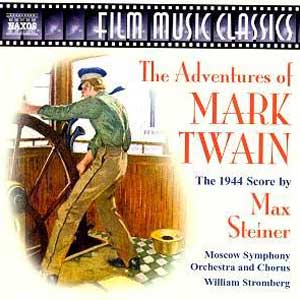The Adventures of Mark Twain (1944)
Music composed by Max Steiner
Moscow Symphony Orchestra and Chorus/William Stromberg
rec. Mosfilm Studio, Moscow, February 2003
Available on Naxos (8.557470)
Running Time: 70:49
Crotchet Amazon UK

I was never a devotee of so-called "classic" films, so it was through RCA's "Classic Film Scores" series on LP that I first got to know the work of the great Hollywood composers. At the time, Max Steiner's music struck me as studied and self-conscious alongside, say, Erich Wolfgang Korngold's full-blooded Straussiana. But that was thirty years ago. This fresh, vivid new recording of Steiner's score for The Adventures of Mark Twain - which received an Academy Award nomination, though the tribulations of World War II disrupted the film's release - underlines what we're missing nowadays, when "film scores" are either electronic constructions or chart-conscious pop and rock anthologies. How ironic that, while the grandeur and textural richness of the "Golden Age" scores could emerge only dimly in monaural sound, today's surround-sound equipment is wasted on synthesizers and booming rock beats.
For this presentation, film music composer and scholar John Morgan has credibly woven the incidental tracks into a continuous seventy-minute concert suite - presumably the "score reconstruction" with which he is credited here. The notes don't suggest anything like the efforts undertaken for the Chandos "British Film Music" series, where the music had literally to be reconstructed from the film soundtracks because the scores were lost or destroyed. The result is quite credible, actually making use of the repetition of motifs to suggest a sort of development.
The music itself is eminently listenable, attractive in a workmanlike rather than an inspired way. Steiner conjures a sort of generic "Americana" from devices like the pentatonic scale (in the title theme, which rather quickly wears out its welcome) and cakewalk syncopations (track 16, "More Squirrels"), and isn't above exploiting familiar melodies for their associations: "Clementine" for the California Gold Rush (track 8) - sounding, amazingly, neither trivial nor pretentious - the "Battle Hymn of the Republic" when General Grant shows up (track 21), "Rule Britannia" in full orchestral panoply for Oxford University (track 27). Despite the occasional representational detail - the pitched woodblocks for the "Buggy Ride" (track 19) an obvious though effective instance - the music isn't as specifically pictorial as the track titles would indicate, at its best when playing against expectations. The "Pirates" of track 2, for example, are a bumptious, jaunty crew out of Peter Pan rather than Errol Flynn swashbucklers. The smaller-scaled moments, including the tender lyrical strains for Livy, Twain's love interest, are charming and appealing. On the other hand, the sliding Hawaiian steel guitar in track 23 ("World Tour Begins") is simply a distraction, and the final choral perorations are a bit much.
Under William Stromberg, an experienced film and pop conductor, the Moscow Symphony has the measure both of the music's big, splashy effects and of its gentler passages, and capture its American accents reasonably. The engineering, by a Russian crew, lags somewhat behind the Western state of the art, much as it did in the Communist era. It offers both brilliance and depth, along with an occasional hard edge that doesn't sound like a function of the playing, and sometimes the winds are indiscreetly over-miked.
Stephen Francis Vasta
3.5
Return to Reviews Index